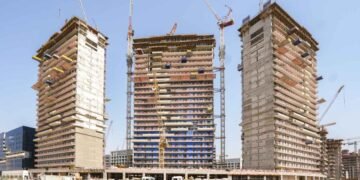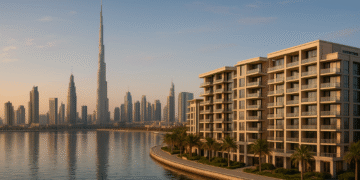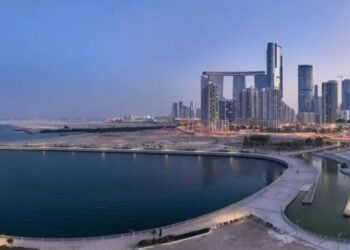Indian high-net-worth individuals (HNWIs) are increasingly turning their attention to Dubai for real estate investments—outpacing traditional global hotspots like London and Singapore. This shift is backed by comparative analysis of yields, regulatory advantages, taxation norms, and lifestyle offerings, all of which make Dubai an appealing destination for affluent Indian investors seeking asset diversification, residency options, and long-term growth.
Surge in Indian Investor Activity in Dubai
According to recent data from the Dubai Land Department (DLD), Indian nationals were among the top five investors in Dubai real estate in H1 2025. The momentum has continued from 2024, during which Indian buyers contributed over AED 35 billion in property transactions. A report by Knight Frank also noted that 27% of Indian ultra-HNIs (with net worth over $30 million) now view Dubai as their preferred international real estate market—up from just 10% in 2020.
Yield Advantage Over London and Singapore
Dubai’s residential property yields remain significantly higher compared to global peers. In 2025, average gross rental yields in Dubai range from 6% to 8%, depending on location and asset class. In contrast:
- London yields average between 2.5% and 3.5%
- Singapore offers around 3% to 4%
This yield differential is crucial for investors focused on income-generating assets.
Also read: Azizi Launches Freehold Residential Project ‘Azizi Abraham’ in Jebel Ali Free Zone
Moreover, property acquisition costs—including taxes and legal fees—are notably lower in Dubai, where there is no capital gains tax, no inheritance tax, and no annual property tax, unlike the UK and Singapore.
Golden Visa Program: A Game Changer
Dubai’s 10-year Golden Visa has emerged as a significant draw for Indian investors, especially for those looking to relocate or establish secondary residences. The eligibility criteria—investment of AED 2 million or more in property—makes it accessible for HNIs who are already considering high-value real estate acquisitions.
Comparative Taxation: Dubai Wins
- Dubai: No personal income tax, capital gains tax, or wealth tax.
- UK: Up to 28% capital gains tax on real estate, 3% additional stamp duty for overseas buyers, and ongoing council taxes.
- Singapore: Up to 30% Additional Buyer’s Stamp Duty (ABSD) for foreigners introduced in 2023, on top of the base buyer’s duty.
These taxation regimes make Dubai one of the most financially efficient places for Indian nationals to park wealth in property.
Lifestyle, Proximity & Connectivity
From a lifestyle perspective, Dubai offers year-round sunshine, world-class amenities, multilingual schooling, and top-tier healthcare—all within a 3.5-hour flight from Mumbai and Delhi. Frequent flyers and business families find this proximity attractive, especially when compared to long-haul flights to London or Singapore.
Also read: Dubai Real Estate Trends 2025–26: What Indian Investors Should Watch For
Also, the city’s rising status as a global business and financial hub makes it appealing not just as a holiday or retirement destination but also as a live-work-play ecosystem.
India-Dubai Corridor: An Economic Anchor
The strong bilateral ties between India and the UAE further enhance investor confidence. The UAE-India Comprehensive Economic Partnership Agreement (CEPA) has deepened trade and investment flows, while the presence of Indian businesses, schools, and cultural institutions in Dubai creates a sense of home away from home.
Real estate consultancy CBRE notes that Indian-owned companies in Dubai are increasingly buying commercial properties to consolidate operations and reduce long-term costs.
Regulatory Environment and Market Transparency
Dubai has made significant strides in regulatory transparency and governance in real estate, achieving a Tier 1 ranking in JLL’s 2024 Global Real Estate Transparency Index. The introduction of digital title deeds, RERA’s property management oversight, and improved escrow norms have added layers of investor protection.
Outlook for 2026: Dubai Still Ahead
Dubai’s off-plan segment is drawing increasing investor interest due to competitive pricing and early-stage capital appreciation.
“With off‑plan transactions now more than double those in the secondary market, Dubai’s residential market is becoming increasingly investor‑driven… Rising inflation and growing affordability challenges, particularly in the rental market, are driving a shift toward suburban areas and the Northern Emirates,” according to Prathyusha Gurrapu, Head of Research & Consulting at Cushman & Wakefield Core.
This trend makes strategic growth areas like MBR City, JVC, and Dubai South especially appealing to Indian HNIs looking for long-term investment potential and scalable entry points.
Analysts expect this trend to continue into 2026, especially with Dubai’s plans to launch new freehold zones, expand Golden Visa eligibility, and push further smart infrastructure investments under the Dubai 2040 Urban Master Plan.
Meanwhile, geopolitical uncertainties and tighter regulations in the UK and Singapore are likely to keep pushing Indian capital towards more stable, tax-efficient destinations—chief among them, Dubai.
Discover more from Invest Dubai Today - Dubai Realty Insights
Subscribe to get the latest posts sent to your email.











































